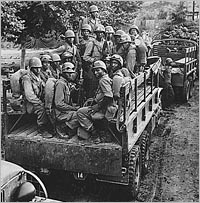 |
 |
 |
||
 |
Home | Cold War Turns Hot | The Armed Forces Integrate | What the Experts Say | ||
|
The Armed Forces Integrate
Bugging Out What the Army called "withdrawal" was often an outright scramble to safety. GIs fought to take a town or a hill, but didn't get enough reinforcement and had to pull back. A new term was coined in Korea for such an inglorious retreat: "bugging out." Senior Army commanders blamed the all-black 24th Infantry for bugging out more often than white units. "They said that the deuce-four was always on the run. Well every outfit I seen in Korea was always on the run," remembers veteran James Williams. "And I fought with all-white outfit—they did the same thing the 24th did." However, in the first weeks of the war, some units never got punished. In white units where men bugged out, officers in charge were transferred out or demoted. End of the Buffalo Soldiers
Within a few months, the Army cracked down hard-- 60 men of the 24th Infantry regiment were court-marshalled for cowardice—a number far higher than the whites in their division. Hammond says, the outfit was snake-bit, their reputation poisoned. In October of '51, after more than a year of combat in Korea, the Army disbanded the Buffalo Soldiers. "It hurt. It hurt. I was hurt," recalls Jesse Brown. "I was hurt because when the U.S. Army was being pushed back to the Japan Sea, they called on my regiment, me, us, I was there, we held that perimeter. We held that perimeter. And we did not fall back. And they did not push us into the Japan Sea. It was my regiment— the 24th regiment— that held that perimeter and did not fall back." Four decades later, Army historians would review the 24th's record and find that its men, individually, fought as bravely and often as well as any others, white or black. But prejudice and poor leadership doomed the 24th. To those in the military who favored integration, the 24th was an example of why all-black units had to go: segregation was bad for morale, it was inefficient, it was outdated. As the fighting in Korea intensified, the military was under increasing pressure to integrate the ranks of officers and enlisted men. Next: No Bigots in Foxholes
|
|||
